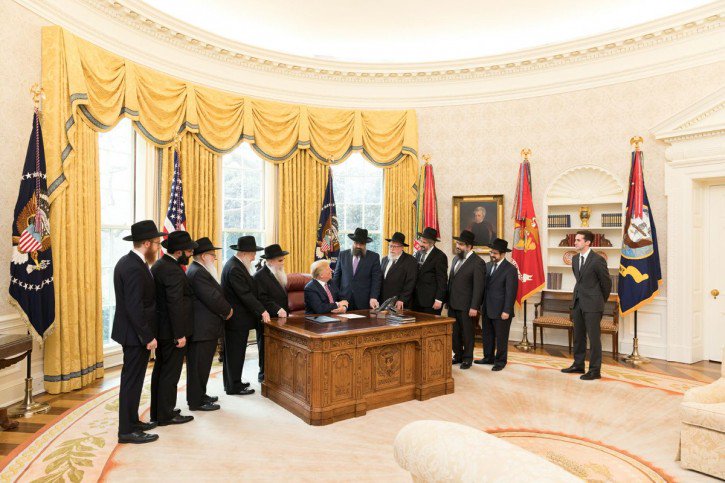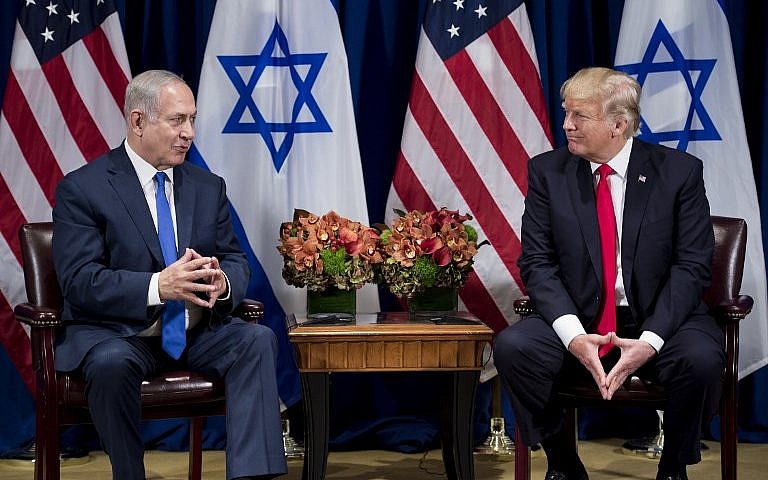
Views: 3524
As news of appointments to the Trump administration flow in, the hard Right is riding high, and anti-Semitism and Zionism are in the news in ways that purveyors of conventional wisdom have to struggle to make sense of. The Trump phenomenon has undone conventional understandings of both.
Trump’s thirty-something son-in-law, Jared Kushner, Ivanka’s husband, embodies a lot of what has put those conventional understandings in doubt. A (modern) orthodox Jew and rabid Zionist, Kushner is not exactly éminence grise material; his is too young and insubstantial to be what Dick Cheney was for George Bush. Nevertheless, he does seem to be stepping into that role, just as Ivanka seems to be stepping into the role of First Lady.
Those two are peas in a pod – spoiled rich kids, fathered by sleazy real estate moguls whose wealth comes from buying influence and gaming the system. The difference is that one of them actually did time – for illegal campaign contributions, tax evasion, and witness tampering – while the other ran for President and won.
 How appropriate that the Age of Trump is starting out as a reality TV show involving Jared and Ivanka and her lesser siblings — plus, of course, Melania, the aging but still beautiful trophy bride who says she just wants to be alone! For the time being, she will not go slumming in the White House but will instead care for her little boy, the Donald’s newest brat, in the Trump penthouse in the sky (while traffic and commerce grind to a halt below).
How appropriate that the Age of Trump is starting out as a reality TV show involving Jared and Ivanka and her lesser siblings — plus, of course, Melania, the aging but still beautiful trophy bride who says she just wants to be alone! For the time being, she will not go slumming in the White House but will instead care for her little boy, the Donald’s newest brat, in the Trump penthouse in the sky (while traffic and commerce grind to a halt below).
Maybe, before long, the show’s producers will have her dump Trump — for trying to prove that whatever Bill can do to White House interns, he can do better. Or, better still, they’ll have him exchange Melania for a newer model. An anxious world will then, once again, be entertained by displays of acrimony such as have not been seen in the Trump world since the tabloid days that first brought him to national attention years ago.
The show goes on forever. The one sure thing is that it is no more likely to turn into a 1950s sitcom than into a forum where serious political ideas matter. This is Trumpland, after all; a world of vulgarity and glitz, and of befuddlement and despair, in which candidate’s “debates” area about penis size, not policies.
Graduate students in Cultural Studies Departments must now be salivating: before long, they will be flooding the market with dissertations with titles like From Ozzie and Harriet to the Adventures of Donald and the Supermodel.
Edward Gibbon, wake up! The world needs you, or someone like you, to make sense of The Decline and Fall of the American Empire.
In that vein, and in light of the increasingly absurd news oozing out of Trump Tower, it is well to remember that, for the office of Roman consul, the Emperor Caligula wanted to nominate his horse. Will Trump top that? Stay tuned. Or ask Kushner.
The contrast between the Trump family and the Nelsons, and, more generally, between now and the fifties, is a good place to start for getting clear on where Trump stands on what German philosophers two centuries ago called “the Jewish Question,” and, accordingly, on the ways that Kushner et. al. are upsetting conventional views of anti-Semitism and of Zionist Jews.
To that end, it is instructive to reflect on the vicissitudes of Jewish identity politics in the United States and other Western countries in the post-World War II era.
Judaism itself, or rather the Judaism of our time and place, has a lot to do with what is now going on. But for making sense of what is confounding the guardians of conventional wisdom, Zionist ideology and the long-range trajectory of Israeli politics are more important. American Judaism has changed a lot in seven decades; Zionism has changed even more.
Back when President Eisenhower commanded “one nation under God” in its struggle against godless, atheistic Communism, if you were an American, you were a Protestant, a Catholic, or a Jew.
Hardly anyone was anything else. There were atheists and agnostics, of course, but overt irreligion was not an option; and, thanks to the decimation of native populations and immigration policies that Trump and his minions can only dream of, nearly everyone’s ancestors had either come from Christian lands or had been converted to Christianity many generations ago.
This began to change in the sixties, but it took decades for the presence of Muslims, much less adherents of less familiar Asian faiths, to register in public consciousness. They were too busy working hard and minding their own business to draw attention to themselves.
But that was then; from the seventies on, Muslims have been high on the nativist hate list.
They are targeted, like other immigrant groups, for being visibly different. But that is not all. They suffer too from the malign neglect of establishment politicians and the media that serve them. This has left them especially susceptible to nativist ire as the War on Terror, essentially a war on the historically Muslim world, has unfolded.
Similar problems affect politically marginal non-Muslim immigrant groups too when their places of origin are important to the empire’s designs, and when their governments resist American domination.
For example, when the Clintons and their European counterparts were dismembering Yugoslavia, Serbian, but not Croatian, immigrants were all of a sudden demonized. The Serbian government was resisting American domination; the Croatian government was not. More importantly, Americans of Serbian origin had been quietly living their lives while a coterie of politically active Croats had been busy for years currying favor with the likes of Joe Biden.
It was not always so; staying under the radar used to help immigrants settle in.
This was true even of Muslims. The Muslim and Christian worlds had once been locked in “a clash of civilizations,” but that was ancient history. From the first days of the republic until well past the Eisenhower era, American nativists didn’t have it in for Muslims, any more than for other non-WASP immigrants, because they didn’t give them any thought.
This was a blessing, but also a curse. It all but guaranteed that the Muslim story, unlike the stories of many earlier targets of nativist ire, was never woven into public perceptions of “the American experience.”
Muslims suffered for this – in 1973, for example, during the oil crisis brought on by the Yom Kippur War, and then, in the later years of the Carter administration, when Zbigniew Brzezinski took a notion to turning Afghanistan into the Soviet Union’s Vietnam by arming and funding Islamists.
“Radical Islamic terrorism,” as our President-elect calls it, was conjured into being, unintentionally but predictably, by that stroke of diplomatic genius.
For these reasons and more, many Americans don’t quite see how being Muslim can be a way of being American – not, as in the past, because they hardly knew that Muslims existed, but because nowadays they can’t stop thinking about the dangers they think they pose.
Trump exploited these fears, and will likely go on doing so. Too bad that thinking a lot about something and thinking cogently and in an informed way about it are not the same thing. If it were, our soon-to-be National Security Advisor Michael Flynn’s laudatory views of what he calls “normal religions” – the religions of Protestants, Catholics, and Jews – and his derogatory view of Islam would be a lot more widely and justifiably mocked than it currently is.
In ancient Rome, Gibbon wrote, all religions were equally true for the ordinary people, equally false for philosophers, and equally useful for magistrates. In the fifties and sixties, the United States, like the rest of the developed world, was on the threshold of regaining that wise and humane sensibility. It may not have looked that way because, under Ike, the “normal religions” were riding high. But God was already on His deathbed.
Beneath the surface, Protestant, Catholic and Jew were becoming cultural and ethnic categories more than religious ones, while religious passions, and therefore religious conflicts, were becoming obsolete. In their stead, a kind of tolerance, born of indifference, was on the rise. This benefited Protestants, Catholics, and Jews; and, along with everyone else, Muslims as well.
This is still the long-range trend. To be sure, the empire’s machinations in the historically Muslim world has encouraged backsliding; and this will only get worse, over the next several years, as some of the vilest Islamophobes in creation take over top military and foreign policy posts, along with the Department of Justice and the agencies that comprise our hypertrophic national security state.
But if we can get past this latest setback, count on the way forward to resume and eventually prevail.
We probably will get past it. With Trump, awful as he is, we at least have a better chance of avoiding nuclear war than we would have had with Hillary Clinton and her gaggle of neocons, Russophobes, and “humanitarian” interveners calling the shots. We have a decent chance now of living to fight another day.
Therefore, God has a better chance of resting in peace.
In the Eisenhower years, if you were Jewish, you were Orthodox, Conservative or Reform. The situation is more nuanced now, but still basically the same – except that nowadays “none of the above” is an option too, the most popular of all.
The differences between the three “denominations” have more to do with observance than doctrine; Judaism has never been demanding in matters of belief. What has divided Jews, especially in the modern era, have been interpretations of and attitudes towards Jewish law (halacha).
In this respect, Judaism and Islam are more alike than Judaism and Christianity. It is a safe bet that the hordes of Islamophobes, Jewish and Christian alike, who prate on about the Judeo-Christian tradition and who demonize sharia law, halacha’s Islamic counterpart, have no inkling.
If you were Orthodox back then, chances are that you were old and born in Europe or living with parents who were. Orthodoxy and modernity were at odds.
Conservative Judaism acknowledged the supremacy of Jewish law too — in theory. In practice, few Conservative Jews were more than superficially observant. This was hypocritical, of course, though there was theology behind it; the idea was to harmonize Judaism and modernity without abandoning one or the other.
What mainly propelled the Conservative movement, though, was what also led, among other things, to the decline of afternoon newspapers and neighborhood bookstores — suburbanization. It was more difficult to be observant in the ‘burbs than in the cities. Some requirements, like not driving on the Sabbath, even made regular synagogue (“temple”) attendance all but impossible for most congregants.
The Conservative Judaism of the time was therefore a hybrid: too orthodox for some, and not orthodox enough for others. As such, it was destined to revert back to more traditional forms or else to move in the opposite direction – towards Reform.
This is what happened. But the Conservative movement nevertheless survived and even flourished because an outside factor, Zionism, effectively superseded its underlying dynamic. Ethno-nationalism breathed new life into the Conservative movement, just as, in due course, it would breathe new life into the others as well.
The purveyors of conventional wisdom seem unaware, but the fact is that well into and even beyond the Eisenhower era, most strains of Orthodox and Reform Judaism were uncomfortable with, or even opposed to, a faith that, in effect, replaced an imaginary God with an imaginary Jewish nation. Only Conservative Judaism never had a problem with the Zionist idea.
There have always been secular Zionists whose attitudes towards the Zionist project were shaped, in part, by concerns for the people already living in Mandate Palestine. But the fact that the Promised Land was emphatically not, as Zionists proclaimed, “a land without a people” had little, if anything, to do with Orthodox or Reform attitudes towards Zionism.
Orthodox Judaism was at odds with Zionism for archaic theological reasons centered on notions of exile and Messianic redemption. Reform Judaism and Zionism were at odds for reasons of a very different kind.
The Reform movement was a creature of the German Enlightenment, in much the way that important strains of liberal Protestantism were. Its guiding conviction was that religious beliefs are matters of private conscience only, and therefore ought to be of no political significance whatever.
There is an obvious tension between that paradigmatically liberal idea, and the idea that Judaism is a religion for a particular ethnic group. For both circumstantial and theological reasons, Reform Jews never quite got past that problem, and therefore, despite obvious doctrinal affinities, never quite succeeded in turning Judaism into another version of, say, Unitarianism.
That was the goal, though — to become something a liberal Protestant denomination, but in a Jewish register. To that end, Reform leaders sought to maintain connections to Jewish traditions, while breaking free from Jewish law. Halachic practices that survived became life-style choices, not sacred obligations.
This break with the past was too radical for many American Jews in the Eisenhower era to abide. There were other barriers too keeping many of them out of the Reform movement. Reform Judaism was mainly a German, not Eastern European, affair. German Jews had come to the United States earlier, were more integrated into American life, and were, for the most part, better off economically than Eastern European Jews. This made for tensions on all sides.
However, by the fifties, these formerly palpable differences were fading. Religious conviction was fading too. Reform Judaism nevertheless did well because, in Eisenhower’s America, everyone had to be something, and, for Jews, being Reform was the next best thing to being nothing at all.
Meanwhile, Zionism was changing – in ways that accommodated the needs not just of the Conservative movement, but Orthodox and Reform Judaism too.
The irreligion of the first Zionists was, of necessity, nuanced; if they wanted to forge an ethnic identity, they had little besides Judaism to work with — no common land, no common language, and, although Zionists would later work hard to fool themselves, no plausible claims of common descent.
But there was nothing nuanced, at first, about religiously grounded Jewish anti-Zionism.
Outside Orthodox circles, however, that opposition was overtaken by events – above all, by the Nazi Judeocide, the Holocaust, and by the problems involved in resettling displaced persons, concentration camp survivors especially, at the end of the Second World War.
Zionists worked hard on many fronts to assure that as many Jews as possible would end up in Palestine, whether that is what they wanted or not. They had an easy time of it too – the governments of the United States and the handful of other countries that could have taken displaced persons in, didn’t mind being relieved of their moral obligations. With anti-Semitic attitudes fading in virulence but still politically relevant, this was the line of least resistance.
Once the establishment of the state of Israel became a fait accompli, Protestants and Catholics were pleased, while Jews were pleased most of all. By then, Jewish opposition to Zionism had all but disappeared, except in isolated Orthodox sects.
The leaders of the Reform movement, finding themselves in much the same straits as their Conservative counterparts, stopped opposing Zionism on principled liberal grounds. To survive at all, even as Judaism-lite, they had little choice but to jump on the Zionist bandwagon. The vast majority of Orthodox Jews were coming around too.
However, it would be an exaggeration to say that, before the 1967 Six Day War, Zionists had hijacked American Judaism. After 1967, with the entirety of Mandate Palestine under Israeli control, it no longer was.
The Orthodox were the last holdouts, but, even in their circles, a notion considered heretical just a few years earlier was becoming mainstream – that the Israeli army could, in effect, preempt Messianic redemption.
Then, a decade later, Zionism itself was hijacked — by the Israeli Right.
For Palestinians, this made little difference. But the difference it made within the Zionist movement was enormous.
For Israel’s first three decades, the men and women who dominated the culture and politics of the country identified with the Left, as it took shape during and after the French Revolution.
Since then, Israel’s culture and politics has been taken over, not continuously but for the most part, by forces of the Right, as it took shape late in the nineteenth century, in the aftermath of the Dreyfus Affair.
That Right is and always has been anti-Semitic; in one way or another. In varying degrees, it has regarded the Jew as the Other, and sought to rid the world, or rather the Christian or post-Christian West, of Jewish influence. The Nazis, in conditions of total war, wanted to rid the world of Jews altogether.
However, in more placid times, anti-Semites and Zionists share a goal: they both want Jews out of historically Christian countries.
Deep historical, psychological and moral factors drew anti-Semites and Zionists apart; but, ultimately, nothing kept them from making common cause once the Zionist movement was taken over by people whose ideological commitments and moral bearings were of a piece with those of their traditional antagonists.
And so, in Trumpland, rightwing Zionists and denizens of the Mannon-Breitbart, alt-right demographic have effectively joined together – to make the world safe for the noxious and malign.
Trump’s Islamophobia is probably more than just for show; he wouldn’t have selected the miscreants he did for top positions if his only goal was to keep on fooling the chumps who voted for him.
But his tolerance of alt-right, hard-core “deplorables,” is probably just a residue of the campaign that brought him to power. Not realizing how inept a candidate Hillary Clinton would be, and how the Democratic Party’s contempt for workers would finally cause many of them not to support her candidacy, he turned over every rock he could find looking for marks he could win over to his side.
It was a calculated move that will likely have awful consequences, but it probably did not come from the heart, except in the sense that Trump has the heart of a mountebank and a huckster.
As surely as magnets attract iron filings, Trump’s flirtations with alt-right lowlifes, and his menacing bluster, brings out the worst in the worst. All vulnerable groups therefore have reason to worry.
But Jews will probably be OK. Trump is almost certainly not an anti-Semite himself, and he is more likely to protect Jews from alt-right depredations than to egg on those who would do them harm.
Awful as he surely is, the Donald is probably no more anti-Semitic than any normal person would be who, from time to time, crosses paths with Sheldon Adelson and others like him, characters straight out of the pages of The Protocols of the Elders of Zion.
Trump is drawn to conspiracy theorists and noxious talk radio personalities, many of whom do have problems with Jews. But he has a Jewish son-in-law and, by conversion, a Jewish daughter. She is his de facto First Lady and also the token non-lunatic in his entourage; he needs her good will. Through her, he even has three halachically certifiable Jewish grandchildren; he will do them no harm.
The attitude of his “senior advisor” and all-around strategist, Steven Bannon, impresario of the “alt-right,” is probably less benign. But by all accounts, he likes Jews too – though only in work settings or from a distance, and only if their Zionist credentials are beyond reproach.
This isn’t just because he is too Islamophobic to care about other “Semites.” It is because he regards rightwing Zionists as allies. He is not wrong. Times have changed; it is no longer necessary, or natural, for Zionists who identify with the historic Right not to make common cause with their ideological comrades, provided only that their anti-Semitism is not too overt.
With so many rightwing Zionists deploying anti-Semitic tropes against Muslims, it was only a matter of time before they and their brothers and sisters under the skin would take the next step. It is a match made in Heaven or rather, since Jews don’t believe in Heaven, in Hell.
So is the Israeli Right’s love affair with Dispensationalists and other Christian Zionists. That on-going dalliance is less blatantly dishonorable, but the essential baseness is the same. And the one seems to have functioned as a gateway drug for the other.
Whatever else might be said against them, the first Zionists at least had enough self-respect not to recruit useful idiots from the ranks of those who believe that they must either accept Christ or be condemned for all eternity to the punishments of hell.
This changed in 1977, when Menachem Begin became Prime Minister of Israel. From that time on, relations between the Israeli Right (and not so Right) and Christian Zionists have only gotten thicker.
The idea seems to be that, if their support for Israel is ardent enough – as it is, in this case, because they believe that Jews must be gathered together in the Holy Land to bring the End Times on — and if they are in a position to be helpful to the state of Israel, then all is forgiven.
Evidently, this way of thinking now applies to anti-Semites too, provided they are discreet.
As adherents of archaic strains of Anglo-Protestant theology, Christian Zionists are not anti-Semites in quite the way that Breitbart fans are; their thinking is too unenlightened for that. But, for as long as modern anti-Semitism has existed, the distance between it and the several varieties of Christian anti-Judaism has never been hard to bridge.
Meanwhile, like their kinder and gentler Conservative cousins, more and more of the Orthodox are making the Jewish nation their God. In Israel, there are the “national religious” parties; in America, we have the “modern Orthodox.”
And now as America turns into Trumpland, we have Jared Kushner, the Trump whisperer, who, thanks to the indispensable Ivanka, seems to be morphing into one of the main powers behind the gilded throne.
With a genuine Left gone missing, the Trump phenomenon, or something like it, was bound to happen as the neoliberal world order implodes.
It was therefore almost predictable that the historic Right would get a new lease on life and, along with it, that classical anti-Semitism would revive.
With the Jewish religion a victim of both modernity and ethno-nationalism, it was nearly as inevitable that Jewish identity politics and classical anti-Semitism would effectively hook up.
What a revolting development!
But this is the sort of thing we are in for now. How and when it will end nobody knows.
The old slogan, “the only solution, revolution,” is more on point than ever in these circumstances; but thanks to the disempowerment of the working class under the aegis of neoliberal politicians like the Clintons, it is more anachronistic than ever too.
However, we need not abandon all hope just yet.
Trump’s victory empowers scoundrels, and makes bedfellows of Zionist ethnocrats and classical anti-Semites. But with the Clintons out of the picture, even centrists and liberals can now confront the debilitating consequences of the neoliberal turn head on.
When enough of them do, when a revived Left wins enough of them over, the centuries old struggle for democracy and for a real internationalism grounded in solidarity, not feckless and complacent celebrations of “difference,” can finally resume.
Origins of images: Facebook, Twitter, Wikimedia, Wikipedia, Flickr, Google, Imageinjection, Public Domain & Pinterest.
Read our Disclaimer/Legal Statement!
Donate to Support Us
We would like to ask you to consider a small donation to help our team keep working. We accept no advertising and rely only on you, our readers, to keep us digging the truth on history, global politics and international relations.










